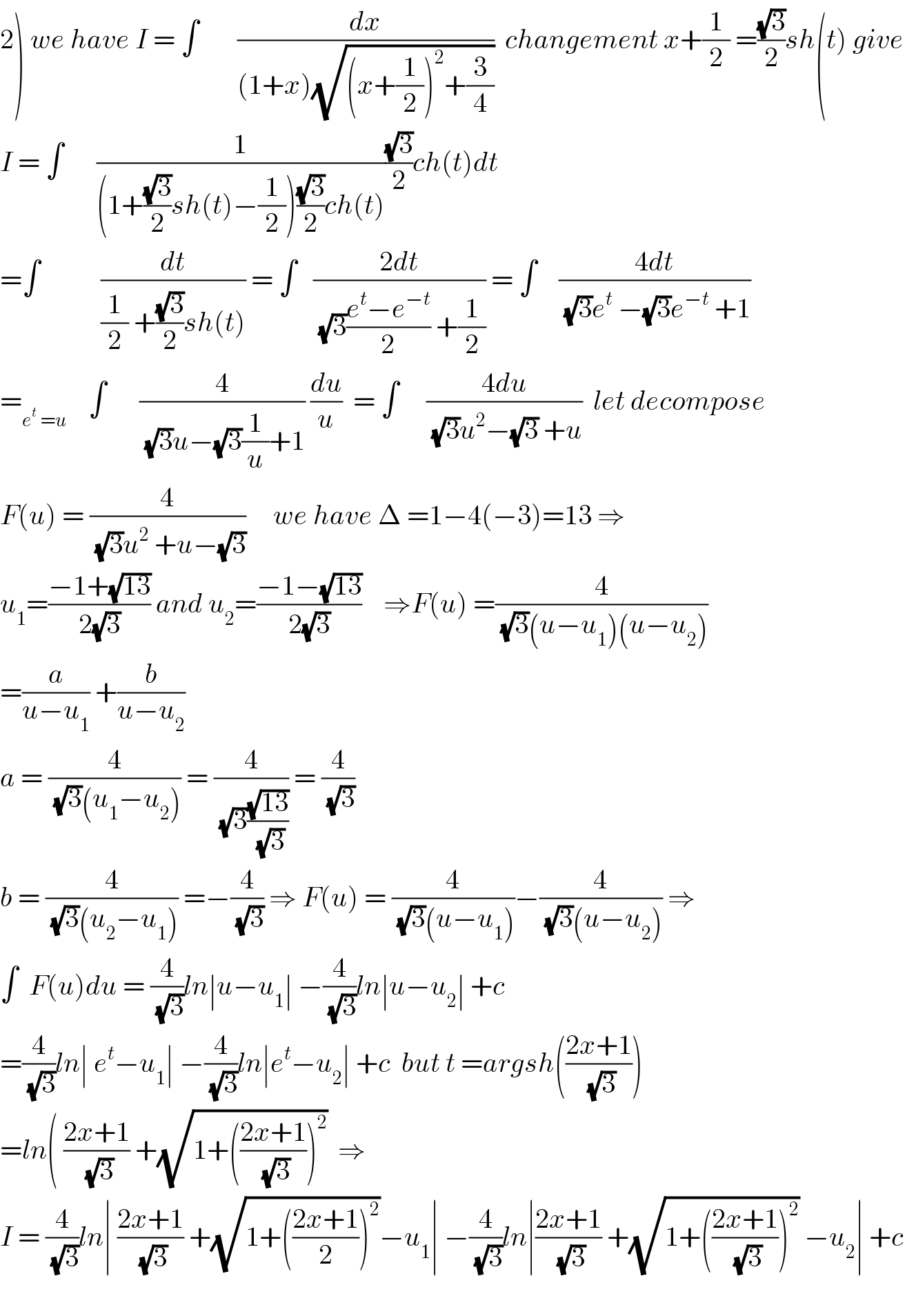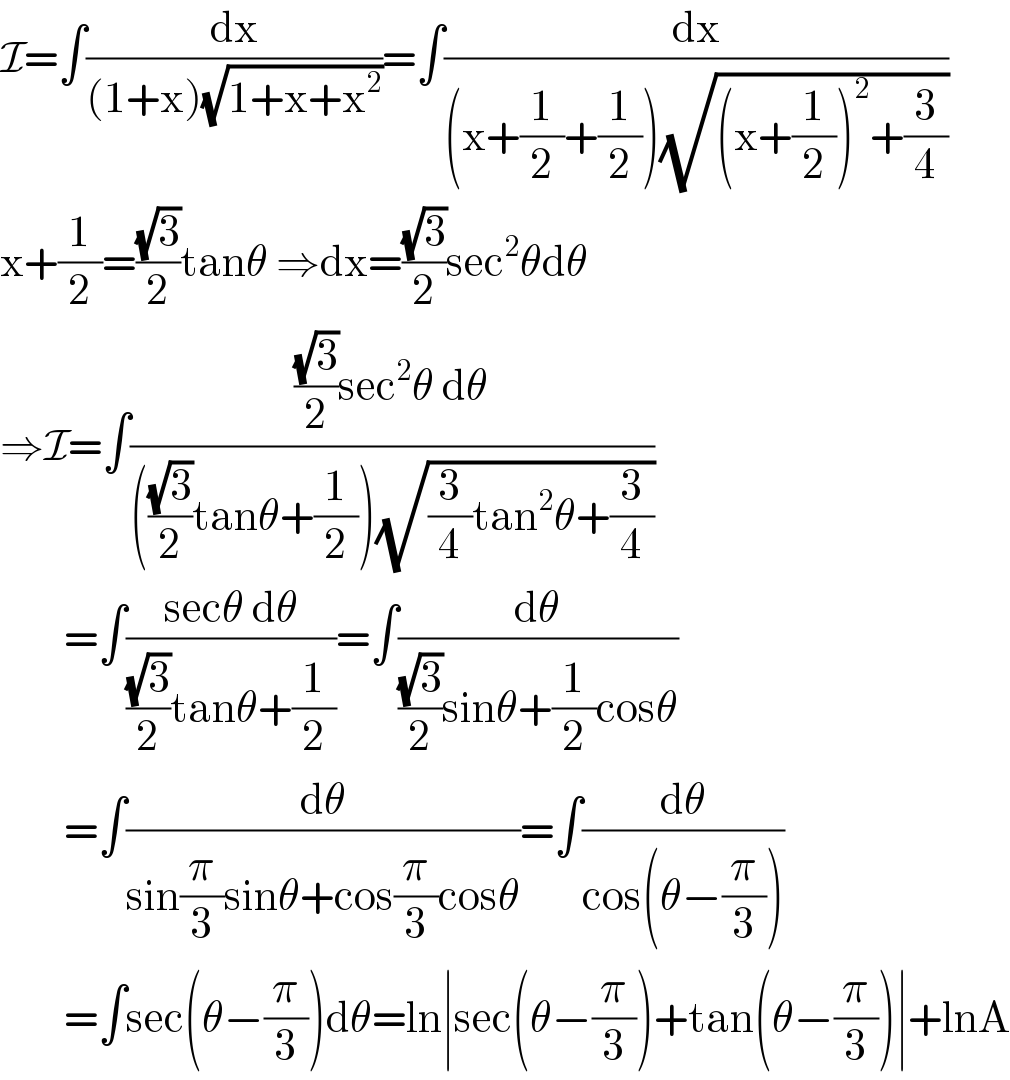
Question and Answers Forum
Question Number 41487 by behi83417@gmail.com last updated on 08/Aug/18

Commented by maxmathsup by imad last updated on 08/Aug/18

Commented by maxmathsup by imad last updated on 08/Aug/18

Commented by behi83417@gmail.com last updated on 08/Aug/18

Commented by math khazana by abdo last updated on 10/Aug/18

Answered by tanmay.chaudhury50@gmail.com last updated on 08/Aug/18

Commented by behi83417@gmail.com last updated on 08/Aug/18

Commented by tanmay.chaudhury50@gmail.com last updated on 08/Aug/18

Commented by behi83417@gmail.com last updated on 08/Aug/18

Answered by tanmay.chaudhury50@gmail.com last updated on 08/Aug/18
![1)∫(1/x).(√((1+x^2 )/(1−x^2 ))) dx ∫(1/x).(√((1+x^2 )/(1−x^2 ))) dx t^2 =((1+x^2 )/(1−x^2 )) 1+x^2 =t^2 −t^2 x^2 x^2 (1+t^2 )=t^2 −1 x^2 =((t^2 −1)/(t^2 +1)) 2xdx=(((t^2 +1)2t−(t^2 −1)(2t))/((t^2 +1)^2 ))dt 2xdx=((2t^3 +2t−2t^3 +2t)/((t^2 +1)^2 ))dt xdx=((2tdt)/((t^2 +1)^2 )) ∫(1/x).(√((1+x^2 )/(1−x^2 ))) dx ∫(√((1+x^2 )/(1−x^2 ))) .((xdx)/x^2 ) ∫t.((2tdt)/((t^2 +1)^2 )).((t^2 +1)/(t^2 −1)) ∫((2t^2 )/((t^2 +1)(t^2 −1)))dt ∫((t^2 +1+t^2 −1)/((t^2 +1)(t^2 −1)))dt ∫(dt/(t^2 −1))+∫(dt/(t^2 +1)) =(1/2)∫(((t+1)−(t−1))/((t+1)(t−1)))dt+∫(dt/(t^2 +1)) =(1/2)[∫(dt/(t−1))−∫(dt/(t+1))]−∫(dt/(t^2 +1)) =(1/2)ln(((t−1)/(t+1)))−tan^(−1) (t)+c =(1/2)ln((((√((1+x^2 )/(1−x^2 ))) −1)/((√((1+x^2 )/(1−x^2 ))) +1)))−tan^(−1) ((√((1+x^2 )/(1−x^(2 ) ))) )+c =(1/2)ln((((√(1+x^2 )) −(√(1−x^2 )) )/((√(1+x^2 )) +(√(1−x^2 )) )))−tan^(−1) ((√((1+x^2 )/(1−x^2 ))) )+c](Q41490.png)
Commented by behi83417@gmail.com last updated on 08/Aug/18

Commented by behi83417@gmail.com last updated on 09/Aug/18

Commented by tanmay.chaudhury50@gmail.com last updated on 10/Aug/18

Answered by Ar Brandon last updated on 28/Jul/20

